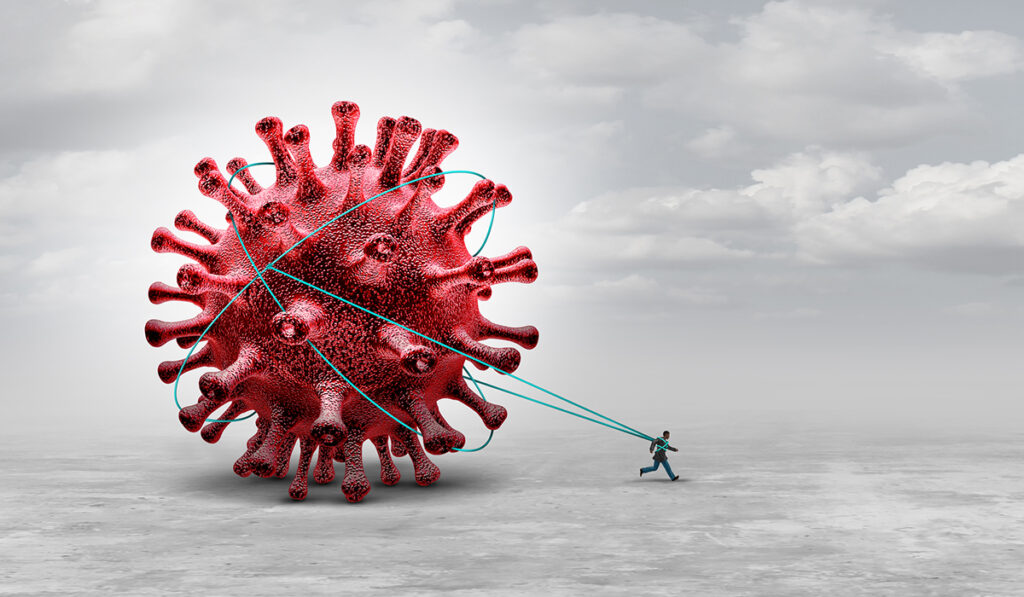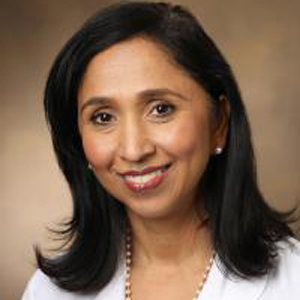Even as clinicians were breathlessly rushing to understand and treat patients with acute SARS-CoV-2, some who had “recovered” from the virus began to show up in clinic.
“We started recognizing that there were a lot of people without acute infection who felt absolutely terrible; they were kind of floating out there not knowing where to go,” said Sapna P. Kripalani, M.D., an assistant professor of medicine and medical director of executive health and wellness at Vanderbilt University Medical Center.
In response, in 2021, Vanderbilt launched the Adult Post-Acute COVID Clinic, led by Kripalani and Sara F. Martin, M.D., an assistant professor of medicine and medical director of outpatient palliative care. Today, the clinic sees patients with long COVID symptoms and makes referrals to specialists within Vanderbilt and to support groups at Vanderbilt’s Critical Illness, Brain Dysfunction and Survivorship (CIBS) Center.
In addition to infectious disease physicians, the clinic encompasses clinicians in a broad array of specialties needed to address the long COVID phenomenon: physical medicine and rehabilitation, cardiology, pulmonology, neurology and autonomic syndromes. It also comprises geriatricians, psychologists and psychiatrists who treat patients with post-intensive care syndrome, which has key overlapping symptoms with long COVID.
No Clear Fix
Roughly 30 percent of patients recovering from COVID-19 continue to have persistent symptoms four to eight weeks post-infection, and many early COVID patients have yet to return to normal function after more than 18 months. Their chief complaints are shortness of breath, fatigue, and brain fog.
“In some cases, there were objective things we could identify, like dropping blood pressure, tachycardia, blood changes, numbness or tingling,” Kripalani said. “In others, however, we would do testing and there didn’t seem to be anything you could really stick your fork in and say, ‘This is the cause.’ Yet, the patients had very real symptoms.”
“It is incredibly frustrating for patients to hear that we don’t have an answer,” added Martin. “They are looking for a promise that they’re going to be back to normal at some given time in the future.”
A Jump-Start on Care
The Vanderbilt team got a running start on treating acute COVID-19 by having telehealth in place prior to the pandemic. This enabled them to see more patients, gauge the timeline of their illness, get them plugged in with specialists as indicated, and transition into long-term care more readily.
“Patients may not be able to recover fully, but they can improve function and they can improve emotionally through being in a clinic that is dedicated to this disease process.”
For long COVID, the chief advantage was having a support structure already in place for patients with post-intensive care syndrome (PICS), which has a broad symptom overlap with long COVID.
Optimizing the Clinic
Today, Vanderbilt offers referrals not only to specialists, but to diverse programs that offer respiratory and exercise therapy, speech therapy, brain games to address “brain fog” and buoy cognitive reserve, and assistance in performing daily activities and getting back to work.
“From breathlessness to joint pain to tachycardia, sufferers from long COVID have a mixed bag of impairments to overcome,” Kripalani said. “If their primary complaint is breathlessness, they may need to work on chromatic breathing. Or they may have joint pain, post-exertional fatigue, or postural orthostatic tachycardia syndrome (POTS). Our physical medicine and rehabilitation experts have therapies targeted to each specific complaint.”
Kripalani finds the support groups to be a game-changer for many patients with brain fog, helping dispel anxiety and depression that only worsen brain function.
“It is incredibly frustrating for patients to hear that we don’t have an answer. They are looking for a promise that they’re going to be back to normal at some given time in the future.”
Learnings on Long COVID
Some key lessons learned are influencing the evolution of the long COVID clinic, Martin said.
One is that airway inflammation can be difficult to identify in imaging or even on pulmonary function studies. Kripalani finds that many patients respond well to inhaled steroids or other inhalers, but that it’s also important to measure exercise capacity and endurance. Patients needing help should get plugged in as early as possible with physical therapy programs.
“We are learning that traditional theories around physical therapy – that it is good to kind of push, push, push – actually have a detrimental effect on these patients,” she said. “Learning some really simple things like breathing techniques seem to work well for this population.”
Also important is early referral to a cardiologist or expert in dysautonomia, which may attenuate longstanding effects of the virus on blood pressure, heart rate and heart function. Ultrasound tests to look for blood clots are also becoming a more routine safety check for long COVID patients.
Gratitude has been the predominant response to the initiative.
“Overall, everyone is just happy to feel like they have a clinical structure that understands as much as we can about their disease,” Martin said. “Patients may not be able to recover fully, but they can improve function and they can improve emotionally through being in a clinic that is dedicated to this disease process,” she said.






